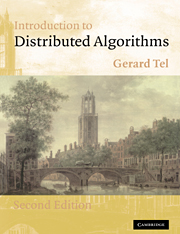2 - The Model
Published online by Cambridge University Press: 05 June 2012
Summary
Several different models of distributed information processing are used frequently in the study of distributed algorithms. The choice of a particular model usually depends on what problem from the area of distributed computing is studied and what type of algorithm or impossibility proof is presented. In this book, although it covers a wide range of distributed algorithms and theory about them, an attempt is made to work in a single, general model, described in this chapter, as much as possible.
In order to admit impossibility results (the proof of the non-existence of an algorithm for some task) the model must be very precise. An impossibility result is a statement about all possible algorithms allowed in a system, hence the model must be precise enough to describe the relevant properties of all admitted algorithms. Yet a computational model is more than the detailed description of a particular computer system or programming language. There are many different computing systems, and we desire that the model is applicable to a class of related systems sharing the essential properties that make them “distributed”. Finally, the model must be reasonably compact, because one may expect that all aspects of a model must be considered in proofs. Summarizing, the model must describe precisely and concisely the relevant aspects of a class of computing systems.
A distributed computation is usually considered as a collection of discrete events, each event being an atomic change in the configuration (the state of the entire system).
- Type
- Chapter
- Information
- Introduction to Distributed Algorithms , pp. 43 - 73Publisher: Cambridge University PressPrint publication year: 2000



